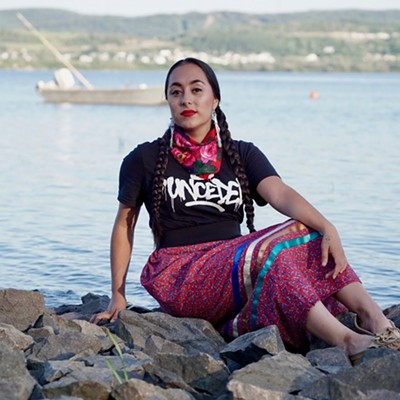
A nti-Black racism, or the policies, decisions and practices that intentionally or unintentionally oppress Black people, is pervasive in Nova Scotia. It is quite literally ingrained in the very fabric of our day-to-day lives. We see anti-Black racism in institutions such as universities, schools and hospitals as well as in policies that govern decisions within those institutions, including admissions, school suspensions and street checks. Anti-Black racism is the reason why Black childbearing persons are more likely to die during birth or why Black folks are more severely impacted by chronic disease. Anti-Black racism has shaped and reshaped this city, causing Black folks to continue bearing the brunt of the socio-economic pressures of gentrification. For evidence of this, you need only look at the transformation of the north end. To understand how anti-Black racism actually works, it is necessary to critically reflect upon and analyze the policies and procedures that enable it.
Don't just take our word for it—the (mis)treatment of Black folks in Halifax has received national and international attention. In 2014, the United Nations declared the years 2015-2024 as the International Decade for People of African Descent. However, in 2016, a Working Group of Experts on People of African Descent visited Toronto, Montreal, Ottawa and Halifax as a part of their report on the status of Black communities across Canada. The working group found that, in Nova Scotia, people of African descent continue to suffer from historical and current effects of racism and segregation. The report explained that Black folks in Nova Scotia are subjected to incessant human rights violations and widespread social injustice. The violations and injustice cross-cut education, health, business and more. Making this issue worse is the lack of data that includes information about race, which would provide insight into current issues, offering grounds for establishing meaningful and effective solutions.
The UN report, combined with relentless advocacy from community groups including the Decade for People of African Descent Coalition, led to the prime minister and the premier acknowledging the decade. Both the federal and provincial governments agree there is a problem and have committed to addressing anti-Black racism. Addressing these challenges, however, means more than recognizing they exist—it means actually shifting policy and policymaking processes towards equity for communities of African descent.
Remarkably, Nova Scotia is the first province in the country to release a policy framework designed to respond to the Working Group's report.
With the release of Count Us In, Nova Scotia's Action Plan for the Decade for People of African Descent in 2019, the province has an opportunity to embark on a critical conversation about the best policy approaches to address anti-Black racism in Nova Scotia and across Canada. There are plenty of questions surrounding this report—from accountability to details of how objectives will be achieved.
To examine important questions and ignite progressive action with regards to the newly released strategies, an expert panel has been convened to discuss the Count Us In report. The panel features four experts from communities of African descent in the province, who will discuss the report and its implications on policymaking efforts in Nova Scotia. The conversation will kick off Black History Month at Dalhousie University on February 3. The session will be moderated by OmiSoore Dryden, the James Robinson Johnson chair for Black Canadian Studies with panelists Crystal Watson, Lindell Smith, El Jones and Wayn Hamilton.
Anti-Black racism is so pervasive in Nova Scotia that the (mis)treatment of Black folks has become normal. The Count Us In report offers solutions to begin unravelling some of these oppressive practices and policies in order to move towards a more equitable and socially just society for all Nova Scotians.















